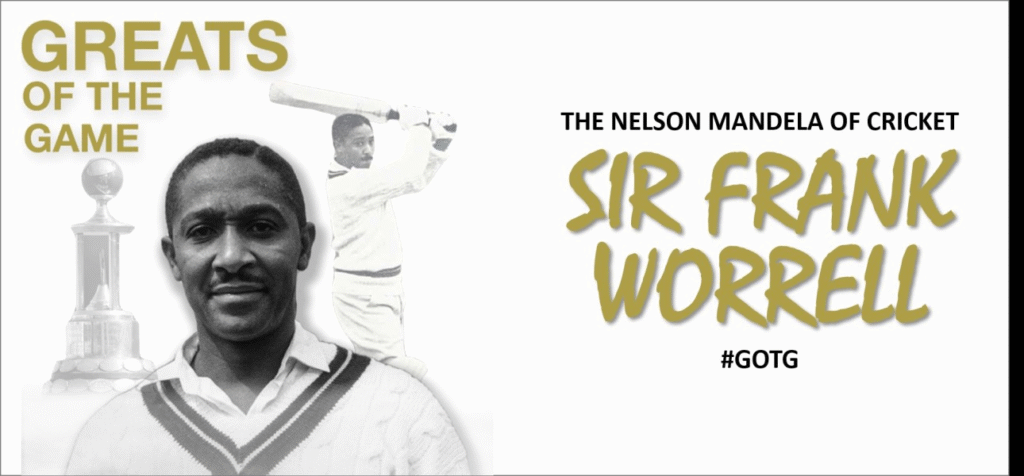With the IPL 23 in full swing, entertainment through cricket is everywhere. As I watched the match between Gujarat Titans and Lucknow Super Giants in the stadium my mind went back to the days of Frank Worrell who was the original proponent of playing cricket to thrill spectators. Worrell was one of the three W’s (Frank Worrell, Everton Weekes, and Clyde Walcott) of West Indies who dominated the cricket world in the nineteen fifties and early sixties through entertaining batsmanship. Worrell was the first person of colour to be named captain of the West Indies team for the 1960-61 series against Australia. Till then, the West Indies team captains for an entire series had always been white cricketers.

The all-conquering Australian team was supposed to roll over the West Indies team. The predicted result by many pundits was a 5-0 sweep by Australia. On landing in Australia, Worrell promised to “re-instill some lost adventure into cricket”. He and his team lived up to the promise and thus was born the entertaining calypso style of cricket with emphasis on playing entertaining cricket even if that meant a greater chance of losing the match. The Australian team led by Ritchie Benaud responded in a similar manner to make the 1960-61 series the most entertaining ever.
The series began with the very first test match becoming the first tied match in the 84-year history of test cricket. The pulsating match with the fortunes swinging from one team to the other was played at ‘the Gabba’ stadium in Brisbane Australia from December 14-19, 1960. Let me describe the last over of the match to capture for you the magic of cricket that the spectators were treated to in the fading lights of that December 19 evening.
The clock read 5:56 PM. Needing 233 runs for victory Australia in their second innings were 227-7 and needed 6 runs to win the match from the 8-ball last over to be bowled by the West Indian fast bowler Wesley Hall. The ball-by-ball description of what happened is as follows:
Ball 1: Wally Grout (Wicket Keeper) was hit on the pads and Ritchie Benaud (Captain) called and crossed over for a single (leg bye). 5 runs needed from 7 balls for a win.
Ball 2: Benaud caught behind by Gerry Alexander (Wicket Keeper). Australia 228-8.
Ball 3: The new batsman, Ian Meckiff played out the first ball. 5 runs needed from 5 balls.
Ball 4: The batsman crossed over for 1 bye from a ball down the leg side. 4 runs needed from 4 balls. Australia 229-8.
Ball 5: Wally Grout fended off a bouncer but the catch at square leg was dropped due to a mix-up. The batsmen crossed over for a single. 3 runs needed from 3 balls. Australia 230-8.
Ball 6: Ian Meckiff hit the ball to mid-wicket. The batsmen attempted to take three runs to win. An accurate flat throw by Conrad Hunte from the deep saw Alexander run out Wally Grout. Australia 232-9. The scores were tied.
Ball 7: The last batsman, Lindsay Kline pushed the ball to square leg and set off for the winning run. Joe Solomon, with one stump to aim at, threw the wicket down from 12 meters and ran out Meckiff by inches.
Australia was bowled out for 232 runs and the match produced the first tied result. The nail-biting finish set the stage for a pulsating series. The match itself is regarded as the greatest test match ever (the highlights of the engrossing match can be watched on https://youtu.be/u_vffcRP8dI) and the series as the best test series ever. The series set a record for spectators with Melbourne Cricket Ground (MCG) recording 90,800 spectators on a single day in February 1961. After over five decades, with a crowd of 91,092, the record was broken by a whisker at the same venue by the Boxing Day attendance in the 4th Ashes Test between Australia and England in 2013.
Worrell and his team won the hearts of Australians. The Australian Cricket Board of Control (chaired at that time by Don Bradman) commissioned Ernie McCormick, a former cricketer, and a professional jeweller, to design a perpetual trophy following the tie. The design incorporated a ball which was used in the tied test match. Such was the influence of Worrell on and off the field that the trophy was named the ‘Frank Worrell Trophy’. In the presence of over forty thousand people, Frank Worrell himself presented the first trophy to Ritchie Benaud the Australian captain after Australia won the pulsating series 2-1 (excerpts from the ceremony can be watched on https://www.youtube.com/watch?v=a1SQSI6pZ3E). As reported in the Wisden Almanack, the West Indians were “given a send-off … reserved for the Royalty and national heroes”. The happy players from the Caribbean were paraded in open cars through the crowd which applauded them for playing cricket as it should be played and being perfect ambassadors for ‘the gentleman’s game’.
Worrell’s leadership on and off the field catalyzed the fight for equality and respect for colored people in the West Indies and other parts of the world. The 1960-61 series contributed in no small measure to the change in the “White Australia” policy that restricted immigration to Australia only for whites. The policy was finally revoked in March 1966. The early sixties also witnessed the Caribbean colonies of Britain gaining independence one after the other. The reverberations from the changes in Australia and the West Indies were also reflected in the USA, where Martin Luther King Jr, a Baptist minister was leading the civil rights movement to earn equality for African Americans in the USA.
Arguably, Frank Worrell was one of cricket’s tallest statesman. As the first person of colour to captain the West Indies cricket team his greatest contribution was to destroy the myth that only a white cricketer was fit to lead a team. After Jamaica achieved independence in August 1962, Worrell was nominated to the Senate, that is the Upper House of the Jamaican parliament. Worrell believed in the political union of the West Indian islands and expressed his disappointment when the short-lived union as the ‘Federation of the West Indies’ ended after four years in May 1962. Worrell believed that just as players from several islands came together to coalesce as a team that became world beaters in cricket, a federation (union) of the island nations would be far better for the nations in the West Indies. Worrell passed away at the age of 42 on March 13, 1967, from Leukaemia before he could give wings to his belief. In recognition of his conviction that strength of West Indian nations lay in unity, Worrell is often referred to as Nelson Mandela of cricket.
As we enjoy the thrill of IPL matches every evening let us remember Frank Worrell who created the calypso style of playing cricket to instill the spirit of adventure in the gentleman’s game to entertain spectators.
hashtag#IPL hashtag#Worrell hashtag#NelsonMandela hashtag#Cricket hashtag#TietTest hashtag#GOTG hashtag#ThreeWs hashtag#WestIndies
